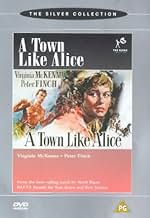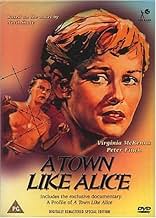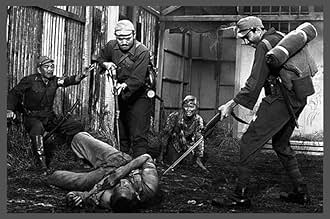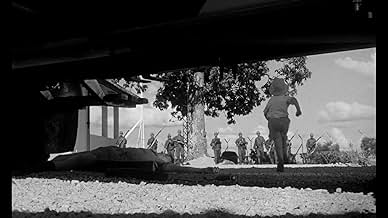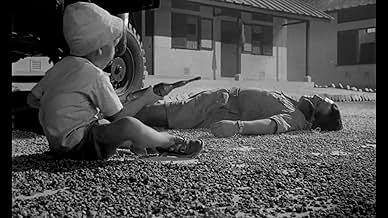IMDb RATING
7.2/10
2.1K
YOUR RATING
A newly wealthy English woman returns to Malaya to build a well for the villagers who helped her during war. Thinking back, she recalls the Australian man who made a great sacrifice to aid h... Read allA newly wealthy English woman returns to Malaya to build a well for the villagers who helped her during war. Thinking back, she recalls the Australian man who made a great sacrifice to aid her and her fellow prisoners of war.A newly wealthy English woman returns to Malaya to build a well for the villagers who helped her during war. Thinking back, she recalls the Australian man who made a great sacrifice to aid her and her fellow prisoners of war.
- Director
- Writers
- Stars
- Won 2 BAFTA Awards
- 2 wins & 5 nominations total
Kenji Takaki
- Japanese Sergeant
- (as Takagi)
Munesato Yamada
- Captain Takata
- (as Yamada)
Otokichi Ikeda
- Kempetei Sergeant
- (as Ikeda)
- Director
- Writers
- All cast & crew
- Production, box office & more at IMDbPro
7.22.1K
1
2
3
4
5
6
7
8
9
10
Featured reviews
Japanese Chivalry
The Rank Organisation went whole hog in producing A Town Like Alice with location shooting in Malaya, Australia, and the United Kingdom. The results were well worth the effort and the film was a big boost to the careers of Peter Finch and Virginia McKenna. In fact as Finch was becoming more and more an international star he would get fewer roles like this one, playing a native Australian.
I was expecting when deciding to view this film that it would be similar in nature to the American film Three Came Home that starred Claudette Colbert as a woman prisoner of the Japanese in World War II. The woman prisoners were segregated, but quickly housed and fended for themselves as best they could, but in a static setting.
When the male prisoners are separated from the females after the fall of Malaya, these woman are put under guard and just sent around like vagabonds with their children if they had them. Why they were selected for this rather special brand of torture we can speculate on end, but whatever the Japanese idea of chivalry was to the women, they couldn't just outright kill them. In fact none are during this film.
The film is seen through McKenna's eyes, she's working as a secretary in Kuala Lampur when the Japanese takeover. She takes over too as guardian of her boss's kids after their mother dies early on in the strange odyssey. Peter Finch plays an Australian soldier who with his mates they constantly run into and who offers them help when he can sneak food and medicine from the Japanese. He pays a heavy price for doing this when he's caught.
When he was killed by Irish Terrorists in 1979, it was learned that Lord Mountbatten had specifically requested that at his funeral no representation from the Japanese was to be permitted. As Supreme Commander of that theater Mountbatten remembered all the horror stories he heard from people survived Japanese internment, even the strange internment where apparently the whole country was their jail.
How McKenna and those that remained survived is quite a story, let's say it involved breaking a lot of cultural barriers to do it. One of the women who did it her own way was Maureen Swanson who after McKenna refuses his proposition, she takes up with a Japanese captain. Swanson is another you'll remember from A Town Like Alice.
Alice refers to Alice Springs in Northern Territory where Finch reminisces he'd like to return. It sounds like heaven, looks pretty good too after the years in Malaya. The film is a really good war film from the not often heard from point of view of woman prisoners.
I was expecting when deciding to view this film that it would be similar in nature to the American film Three Came Home that starred Claudette Colbert as a woman prisoner of the Japanese in World War II. The woman prisoners were segregated, but quickly housed and fended for themselves as best they could, but in a static setting.
When the male prisoners are separated from the females after the fall of Malaya, these woman are put under guard and just sent around like vagabonds with their children if they had them. Why they were selected for this rather special brand of torture we can speculate on end, but whatever the Japanese idea of chivalry was to the women, they couldn't just outright kill them. In fact none are during this film.
The film is seen through McKenna's eyes, she's working as a secretary in Kuala Lampur when the Japanese takeover. She takes over too as guardian of her boss's kids after their mother dies early on in the strange odyssey. Peter Finch plays an Australian soldier who with his mates they constantly run into and who offers them help when he can sneak food and medicine from the Japanese. He pays a heavy price for doing this when he's caught.
When he was killed by Irish Terrorists in 1979, it was learned that Lord Mountbatten had specifically requested that at his funeral no representation from the Japanese was to be permitted. As Supreme Commander of that theater Mountbatten remembered all the horror stories he heard from people survived Japanese internment, even the strange internment where apparently the whole country was their jail.
How McKenna and those that remained survived is quite a story, let's say it involved breaking a lot of cultural barriers to do it. One of the women who did it her own way was Maureen Swanson who after McKenna refuses his proposition, she takes up with a Japanese captain. Swanson is another you'll remember from A Town Like Alice.
Alice refers to Alice Springs in Northern Territory where Finch reminisces he'd like to return. It sounds like heaven, looks pretty good too after the years in Malaya. The film is a really good war film from the not often heard from point of view of woman prisoners.
A gutsy and gut wrenching 1950s low budget movie about WWII in Malaysia
A Town Like Alice (1956)
A remarkable movie, completely under everyone's radar, about a group of English women in Asia during World War II. They suffer under the hands of the Japanese not as prisoners, quite, but as refugees caught between captors. Having nowhere to go and no one to protect them, they end up walking and walking, through jungle and no-man's land, past actual POW camps and through native villages, until gradually they start to die from the hardship.
Mixed into this really vivid and heartbreaking drama is a love affair between a passing Australian soldier and one of the women. The man is a prisoner of the Japanese who seems to have some freedom because he can fix things for them, and he crosses paths with the women a few times over the years.
Years, yes. The movie moves quickly through a long period of war. This is the real war for most people, the occupation by the Japanese and their arrogance, and the patience and impotence of ordinary people. It is told with alarming frankness. I mean, it's still a movie from the 1950s, not a documentary, but the plainness of the actors, the relatively low budget of the film, and the location shooting all make for a convincing final product. It's amazing, at times, and heartwarming as much as heartwrenching. There is even the one terribly good Japanese soldier trapped by the same bigger circumstance of a war that was not his doing.
The one known actor here is Peter Finch, who is marvelous, even though his role is limited. He is meant to be a bright spot in the life of this woman, and he is wonderfully bright and cheerful (a true Aussie stereotype that we all love).
The book that inspired the movie is widely regarded to this day, and was written by Nevil Shute, who heard about a group of Dutch (not English) women shuttled about by the Japanese in Dutch Malaysia during the war. It turns out that they were not usually made to walk, but Shute's misunderstanding of the story led to the main drama of the book and later movie. The crucifixion of prisoners by Japanese soldiers (shown in the movie) is substantiated, however, and it's a gruesome final turn of events for the plot.
There are few movies of this post-war period that really deal with ordinary suffering by ordinary people in Asia during the war (the suffering of civilians in Europe or Britain is fully shown, by contrast). This one does it well, very well. A wonderful surprise.
A remarkable movie, completely under everyone's radar, about a group of English women in Asia during World War II. They suffer under the hands of the Japanese not as prisoners, quite, but as refugees caught between captors. Having nowhere to go and no one to protect them, they end up walking and walking, through jungle and no-man's land, past actual POW camps and through native villages, until gradually they start to die from the hardship.
Mixed into this really vivid and heartbreaking drama is a love affair between a passing Australian soldier and one of the women. The man is a prisoner of the Japanese who seems to have some freedom because he can fix things for them, and he crosses paths with the women a few times over the years.
Years, yes. The movie moves quickly through a long period of war. This is the real war for most people, the occupation by the Japanese and their arrogance, and the patience and impotence of ordinary people. It is told with alarming frankness. I mean, it's still a movie from the 1950s, not a documentary, but the plainness of the actors, the relatively low budget of the film, and the location shooting all make for a convincing final product. It's amazing, at times, and heartwarming as much as heartwrenching. There is even the one terribly good Japanese soldier trapped by the same bigger circumstance of a war that was not his doing.
The one known actor here is Peter Finch, who is marvelous, even though his role is limited. He is meant to be a bright spot in the life of this woman, and he is wonderfully bright and cheerful (a true Aussie stereotype that we all love).
The book that inspired the movie is widely regarded to this day, and was written by Nevil Shute, who heard about a group of Dutch (not English) women shuttled about by the Japanese in Dutch Malaysia during the war. It turns out that they were not usually made to walk, but Shute's misunderstanding of the story led to the main drama of the book and later movie. The crucifixion of prisoners by Japanese soldiers (shown in the movie) is substantiated, however, and it's a gruesome final turn of events for the plot.
There are few movies of this post-war period that really deal with ordinary suffering by ordinary people in Asia during the war (the suffering of civilians in Europe or Britain is fully shown, by contrast). This one does it well, very well. A wonderful surprise.
A strong story makes for a good film
A Town Like Alice is now an old film. However it has a certain directness and freshness which makes it quite watchable.
A Town like Alice is the story of an English nurse, who is trapped in Malaya with a group of Englihs women during the Japanese invasion. As the group can't be categorised by the Japanese army into a useful pigeonhole, they are forced to walk from city to city looking for a place to be prisoners-of-war.
The story is a strong one and the movie doesn't let the book down. Shot in excellent locations in Malaysia, the only problems are fitting the breadth of the story into a limited time.
A Town like Alice is the story of an English nurse, who is trapped in Malaya with a group of Englihs women during the Japanese invasion. As the group can't be categorised by the Japanese army into a useful pigeonhole, they are forced to walk from city to city looking for a place to be prisoners-of-war.
The story is a strong one and the movie doesn't let the book down. Shot in excellent locations in Malaysia, the only problems are fitting the breadth of the story into a limited time.
A film like no other
This is a moving film with a stunning performance by Virginia McKenna. It also has Peter Finch in a portrayal of what must be the quintessential Australian character of the period.
The film is told in flashback as Virginia McKenna's character, Jean Paget, goes back to Malaya after WW2 to help the villagers who saved her life. We learn that Jean was captured there by the Japanese along with a group of other British women and children.
They are sent from town to town on foot. However, no Japanese will take responsibility for them - they walk hundreds of miles and many die. They encounter an Australian, Joe Harman, played by Peter Finch, who finds them food and medicine. Finally, the survivors see out the rest of the war in a Malay village. After the war, Jean travels back to Malaya and then to Australia to learn of Joe's fate.
I saw this film in a packed cinema in Sydney when it was first released in 1956. I was quite young, but there would no doubt have been many in the audience who had first-hand experience of war with the Japanese, including my father. The film resonated with Australians who did not feel great love for the Japanese at the time, mainly due to their treatment of prisoners of war.
Also at that time, Australians were rarely depicted on the screen, but Aussie, Joe Harman, has a key role, which accorded with the idealised national character of the day, unfortunately including his use of derogatory terms for native peoples, common at the time.
Although much of the film was shot in the studio, there was enough location shooting in Malaya and Australia to give it a feeling of authenticity.
It is a harrowing story with many heartbreaking scenes. It vividly captures the fall of empire as the Japanese supplant the British in Malaya, and humiliate them in front of their former colonial subjects. The scenes of the women and children trudging along holding their meagre possessions or the little girl looking back as she leaves a beloved rocking horse show their comfortable lifestyles torn asunder.
Jean Paget emerges as one of the strong characters of the group. This is such a truthful performance by Virginia McKenna who looks beautiful even though she is covered in sweat and dirt for much of the film.
The story is fictional. It is based on Neville Shute's novel, which he based on the plight of a group of Dutch women in similar circumstances in Sumatra. However, it is possible they didn't actually have to walk everywhere. In that case does the film slander the Japanese?
Fresh in people's minds when the film came out, was the knowledge that the Japanese had carried out a number of death marches in the Philippines and Borneo as well as atrocities on the Thailand-Burma Railroad. Japanese troops had also been involved in the massacre of prisoners of war, nurses and tens of thousands of Chinese civilians in Singapore and elsewhere.
The events in "A Town Like Alice" may be fictionalised but they fit the modus operandi. The militaristic Japanese regime of the time looked with contempt on people who surrendered in war, and this often manifested itself in cruel treatment.
Although the Australian-made mini-series with the charismatic Bryan Brown and luminous Helen Morse brought more of the book to the screen, I don't think it diminishes this version at all - it is still unforgettable.
The film is told in flashback as Virginia McKenna's character, Jean Paget, goes back to Malaya after WW2 to help the villagers who saved her life. We learn that Jean was captured there by the Japanese along with a group of other British women and children.
They are sent from town to town on foot. However, no Japanese will take responsibility for them - they walk hundreds of miles and many die. They encounter an Australian, Joe Harman, played by Peter Finch, who finds them food and medicine. Finally, the survivors see out the rest of the war in a Malay village. After the war, Jean travels back to Malaya and then to Australia to learn of Joe's fate.
I saw this film in a packed cinema in Sydney when it was first released in 1956. I was quite young, but there would no doubt have been many in the audience who had first-hand experience of war with the Japanese, including my father. The film resonated with Australians who did not feel great love for the Japanese at the time, mainly due to their treatment of prisoners of war.
Also at that time, Australians were rarely depicted on the screen, but Aussie, Joe Harman, has a key role, which accorded with the idealised national character of the day, unfortunately including his use of derogatory terms for native peoples, common at the time.
Although much of the film was shot in the studio, there was enough location shooting in Malaya and Australia to give it a feeling of authenticity.
It is a harrowing story with many heartbreaking scenes. It vividly captures the fall of empire as the Japanese supplant the British in Malaya, and humiliate them in front of their former colonial subjects. The scenes of the women and children trudging along holding their meagre possessions or the little girl looking back as she leaves a beloved rocking horse show their comfortable lifestyles torn asunder.
Jean Paget emerges as one of the strong characters of the group. This is such a truthful performance by Virginia McKenna who looks beautiful even though she is covered in sweat and dirt for much of the film.
The story is fictional. It is based on Neville Shute's novel, which he based on the plight of a group of Dutch women in similar circumstances in Sumatra. However, it is possible they didn't actually have to walk everywhere. In that case does the film slander the Japanese?
Fresh in people's minds when the film came out, was the knowledge that the Japanese had carried out a number of death marches in the Philippines and Borneo as well as atrocities on the Thailand-Burma Railroad. Japanese troops had also been involved in the massacre of prisoners of war, nurses and tens of thousands of Chinese civilians in Singapore and elsewhere.
The events in "A Town Like Alice" may be fictionalised but they fit the modus operandi. The militaristic Japanese regime of the time looked with contempt on people who surrendered in war, and this often manifested itself in cruel treatment.
Although the Australian-made mini-series with the charismatic Bryan Brown and luminous Helen Morse brought more of the book to the screen, I don't think it diminishes this version at all - it is still unforgettable.
A great movie
I have the video of this movie which I got a few years back. I wish they would bring this movie out on DVD. Its wonderfully acted. Hard to believe this was based on a true story. I can't believe these women marched hundreds of miles, having nothing to eat much of the time and some of their companions dying along the way. They must have been a hardy bunch. Its too bad more people couldn't see this movie. Virginia McKenna and Peter Finch were excellent as the main characters and the rest of the supporting cast were very good too. I'm glad to have the video, but would very much like to see a DVD come out on it. The movie is in black and white but this in no way detracts from the story or the acting.
Did you know
- TriviaAccording to the book 'The Golden Gong---Fifty years of the Rank Organisation, its films and its stars' by Quentin Falk, "While at premiere of a Disney film, 'Robin Hood' [See: The Story of Robin Hood and His Merrie Men (1952)], he [Earl St. John] was particularly impressed by the young man who played the Sheriff of Nottingham. The name on the programme was that of Peter Finch. St. John bumped into Finch on the stairs of the theatre and invited him to come and talk business at Pinewood. Next day he gave Finch what would be a pivotal role in his burgeoning career: the Australian soldier, Joe, in A Town Like Alice (1956).
- GoofsHarry Corbett bought his Sooty puppet from a regular store---he didn't design or create it as such. It's possible therefore that Freddie might have had the same puppet before Harry Corbett gave it national fame.
- Quotes
[repeated line]
Japanese Sergeant: Japanese women walk!
- Crazy creditsOPENING CREDITS PROLOGUE: "The characters in this story are fictitious. The story itself however is based upon true fact."
- ConnectionsFeatured in A Profile of 'A Town Like Alice' (2001)
- How long is A Town Like Alice?Powered by Alexa
Details
- Release date
- Country of origin
- Languages
- Also known as
- The Rape of Malaya
- Filming locations
- Kuala Lumpur, Malaysia(establishing shot of British Government Offices - now the Sultan Abdul Samad Building)
- Production companies
- See more company credits at IMDbPro
- Runtime
- 1h 57m(117 min)
- Color
- Aspect ratio
- 1.66 : 1
Contribute to this page
Suggest an edit or add missing content


